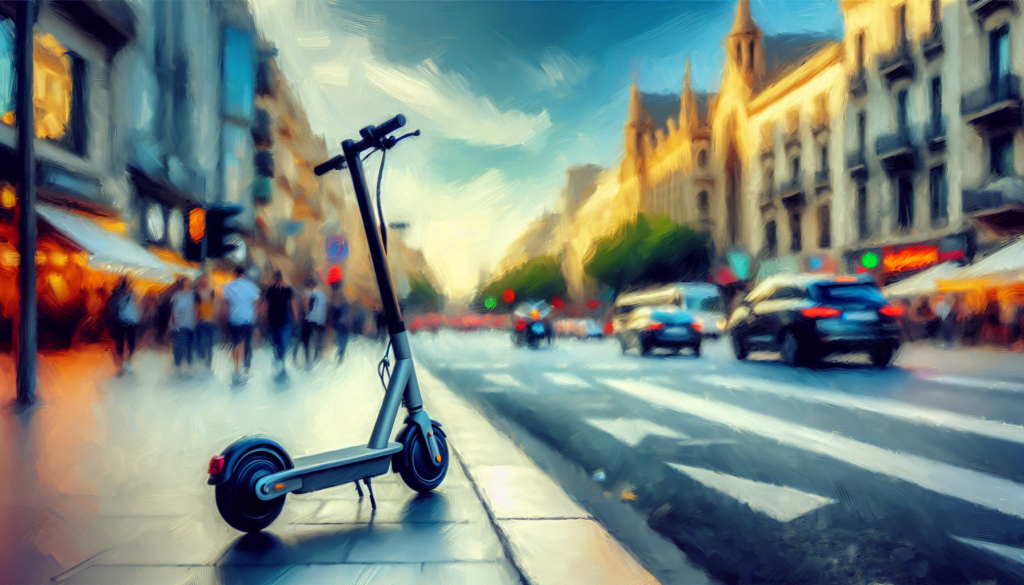
As Malaysia grapples with the rising challenges of urban pollution and climate change, innovative solutions to reduce carbon emissions have never been more crucial. Among these solutions, electric scooters are emerging as a practical and eco-friendly alternative to traditional vehicles. With their significantly lower carbon footprint, electric scooters offer a sustainable mode of transportation that can ease the congestion on bustling city streets while also contributing to cleaner air. By choosing electric scooters, residents can actively participate in the fight against climate change and embrace a greener future for Malaysia.
The Environmental Impact of Traditional Transportation
The environmental impact of traditional transportation methods in Malaysia has been significant and increasingly concerning. The heavy reliance on petrol-fueled vehicles contributes to elevated greenhouse gas emissions, leading to air pollution and adverse effects on public health. In bustling urban areas, traffic congestion exacerbates these issues, resulting in larger carbon footprints. According to the Malaysian Ministry of Transport, transport contributes to over 20% of the country’s total carbon emissions. This scenario urges a transition towards greener alternatives, wherein electric scooters present a viable and sustainable option. With their zero tailpipe emissions, electric scooters can significantly lower the carbon output associated with daily commutes in cities like Kuala Lumpur.
As consumers are becoming more eco-conscious, the shift towards electric mobility is gaining impressive momentum. Electric scooters, such as the OEM Xiaomi Escooter and Eko Life eDegree CS1, are engineered for efficiency and lower environmental impact while offering practical solutions for urban travel. Featuring maximum speeds reaching up to 30 KM/h and ranges between 25-35 km, these scooters are designed for the urban user. By opting for electric scooters over traditional vehicles, Malaysians can contribute to reducing the nation’s carbon footprint, promoting cleaner air, and fostering a sustainable environment. Future investments and policies supporting electric scooter infrastructure will only enhance these benefits, further reinforcing their role in achieving ecological sustainability in Malaysia.
Understanding Electric Scooters: A Sustainable Alternative
Electric scooters are emerging as a key player in the push for sustainable transportation solutions, particularly in Malaysia. These eco-friendly vehicles are designed to offer an efficient and practical means of commuting, with models like the OEM Xiaomi Escooter, which weighs only 12kg and features a max speed of 30KM/h. With a battery capacity of 36V 6AH, it provides a range of 25-35km on a single charge, making it an ideal choice for urban riders.
Similarly, models such as the Eko Life eDegree CS1, while slightly heavier at 14kg, offer a longer range of 35km thanks to its more powerful 36V 8AH battery. Both options come with a warranty of one year and present affordable price points, highlighting their accessibility in the market.
The advantages of switching to electric scooters extend beyond convenience; they also play a crucial role in reducing carbon emissions. Traditional gasoline-powered vehicles contribute significantly to air pollution and greenhouse gas emissions. Electric scooters, on the other hand, produce zero emissions during operation, significantly lessening the carbon footprint associated with transportation. The eDegree FS1, although a seated scooter, maintains this principle, with an impressive range of 35-40km on a 48V 10AH battery. As riders embrace this modern eco-friendly alternative, Malaysia can take a significant step towards a greener future while promoting healthier and more sustainable urban environments.
Overview of Popular Electric Scooters in Malaysia
In Malaysia, the popularity of electric scooters has surged as individuals look for more sustainable transportation options. Among the most well-known models is the OEM Xiaomi Escooter, which weighs just 12kg and boasts a maximum speed of 30KM/h along with a 36V 6AH battery. This model offers a range of 25-35km, making it a viable choice for urban commuting, all at an attractive price of RM 1,188. Also making waves in the eco-friendly transport sector is the Eko Life eDegree CS1, heavier at 14kg, with a more powerful 36V 8AH battery which provides a range of 35km for RM 1,588, demonstrating that electric scooters can offer practicality without compromising on performance.
For those seeking more comfort, the eDegree FS1 is a seated scooter weighing 23kg, enhanced with a robust 48V 10AH battery that extends its range to 35-40km, priced at RM 2,788. This model caters to a broader demographic, proving that electric scooters can suit various personal needs while contributing positively to carbon emission reduction. As these lightweight, efficient machines become staples on Malaysian roads, their role in ushering in a greener future remains invaluable.
Comparing Specifications: OEM Xiaomi Escooter vs. Eko Life eDegree CS1 vs. eDegree FS1
When considering electric scooters as a sustainable mode of transport in Malaysia, it is essential to compare their specifications to understand their potential impact on carbon emissions. The OEM Xiaomi Escooter, which weighs only 12kg, offers a maximum speed of 30KM/h, powered by a 36V 6AH battery that provides a range of 25-35km. Priced at RM 1,188, it presents an affordable option for urban commuters looking for a lightweight and efficient way to travel.
In contrast, the Eko Life eDegree CS1, weighing 14kg, features a more robust 36V 8AH battery, allowing it to cover a distance of 35km for RM 1,588. This scooter strikes a balance between performance and weight, making it a strong contender for daily use, especially in congested city environments.
For those seeking a seated option, the eDegree FS1 is a notable mention. Weighing 23kg, it boasts a powerful 48V 10AH battery that offers an impressive range of 35-40km, but it comes at a premium price of RM 2,788. This seated electric scooter targets individuals who prioritize comfort over portability. Overall, with varying specifications and prices, each electric scooter provides a unique solution to help Malaysians reduce their reliance on carbon-emitting vehicles and support a greener, more sustainable future.
How Electric Scooters Fit into Malaysia’s Urban Mobility Plans

Electric scooters are emerging as a crucial component of Malaysia’s urban mobility plans, particularly in cities where traffic congestion and pollution are significant concerns. With the implementation of electric scooters like the OEM Xiaomi Escooter and the Eko Life eDegree CS1, urban dwellers now have access to a sustainable mode of transportation. The Xiaomi Escooter, weighing only 12kg, has a maximum speed of 30KM/h and ranges between 25-35km, making it highly efficient for short commutes. Meanwhile, the Eko Life eDegree CS1, slightly heavier at 14kg, offers a longer range of 35km.
Both options present an eco-friendly alternative to conventional gasoline-powered vehicles, significantly reducing carbon emissions in densely populated areas. By incorporating such electric scooters into the urban transport framework, Malaysian cities can promote greener mobility solutions, ultimately improving air quality and reducing traffic congestion. The integration of electric scooters in Malaysia’s urban mobility plans not only enhances convenience and connectivity for commuters but also aligns with the country’s goal of creating a sustainable environment.
The growing popularity of these vehicles encourages individuals to shift from traditional modes of transport, resulting in fewer cars on the roads and lower greenhouse gas emissions. As cities expand, initiatives to develop infrastructure that supports electric scooters, such as dedicated lanes and charging stations, will be crucial. This shift not only aids in combating urban pollution but also paves the way for a greener future, reflecting a broader movement toward sustainable urban living in Malaysia.
Community Initiatives Supporting Electric Scooter Adoption
Community initiatives across Malaysia are increasingly recognizing the potential of electric scooters as a sustainable mode of transportation. Local governments and organizations are launching campaigns to promote the use of electric scooters through workshops, ride-sharing programs, and infrastructure improvements, such as the installation of dedicated scooter lanes and charging stations. By creating a supportive environment for electric scooters, these initiatives aim to not only increase awareness and accessibility but also to encourage citizens to choose this eco-friendly alternative over traditional gas-powered vehicles, thereby significantly contributing to a reduction in carbon emissions. In addition to infrastructure development, various community groups are working to facilitate access to electric scooters through subsidized pricing or leasing programs.
For instance, events that allow residents to test ride models like the OEM Xiaomi Escooter or Eko Life eDegree CS1 showcase the performance and benefits of these vehicles firsthand. As more people engage with electric scooters and experience their advantages, the shift toward greener transportation options becomes more achievable. Such community initiatives not only support the local economy but also play a crucial role in fostering a culture of sustainability and environmental consciousness among Malaysians, crucial steps toward a greener future.
Future Trends: The Evolution of Electric Scooters in Malaysia
The landscape of electric scooters in Malaysia is continuously evolving, driven by technological advancements and a growing awareness of environmental sustainability. As urban congestion increases and air quality diminishes, the demand for eco-friendly transportation options becomes more pressing. Manufacturers are responding with innovative designs, enhanced battery life, and improved performance. For instance, the OEM Xiaomi Escooter, weighing just 12kg, can reach speeds of up to 30KM/h with a range of 25-35km on a single charge, making it an attractive option for urban commuters. With competitive pricing around RM 1,188, this model exemplifies how electric scooters can provide accessible and practical solutions for reducing carbon footprints in urban environments.
As more Malaysians recognize the benefits of electric scooters, we can expect shifts in consumer preferences toward more advanced models, such as the Eko Life eDegree CS1 and eDegree FS1. The Eko Life eDegree CS1, for instance, offers a slightly larger battery capacity of 36V 8AH, allowing for a longer range of 35km. With its 14kg weight and a competitive price of RM 1,588, it also showcases the trend toward heavier, yet more powerful electric scooters that deliver both comfort and efficiency. The evolution of electric scooters represents not just technological growth, but a significant movement toward greener cities in Malaysia, promoting sustainable transport options that contribute to reducing carbon emissions.
Embracing Sustainable Mobility with Electric Scooters

In conclusion, the rise of electric scooters in Malaysia marks a pivotal shift towards sustainable mobility. With models like the OEM Xiaomi Escooter and the Eko Life eDegree CS1 offering impressive features such as efficient ranges and competitive prices, more Malaysians can opt for environmentally friendly modes of transport. Not only do these electric scooters help reduce the carbon footprint, but they also alleviate congestion and promote healthier living by encouraging outdoor activity and reducing reliance on fossil fuel-powered vehicles.
As we look to the future, it is essential for individuals, communities, and policymakers together with us at EKO Life MY to embrace electric scooters as a practical alternative to traditional transportation. Investing in infrastructure to support electric scooter use, such as dedicated lanes and charging points, can further enhance their adoption. By choosing electric scooters, we are not just making a choice for convenience; we are taking significant strides toward a greener and more sustainable Malaysia. Let’s ride toward a cleaner future together!

I didn’t find much info in the summary. Hope the article gets more in depth.
I don’t quite get the point of the blog post. Could you elaborate on what you are trying to say?
Thank you for your honest feedback, Daniel Lee. We’re sorry to hear that our blog post didn’t quite hit the mark. We’re more than happy to help clarify and provide additional context. Our blog aims to empower bicycle, ebike, and escooter enthusiasts in Malaysia through articles on affordable products, quality servicing, and community building. If you’re interested in learning more, please feel free to contact us at [email protected] or call us at +60 3-7890 3042. We’d be delighted to help you better understand our mission.
Interesting, but could you make the blog post longer or provide some visual aids to capture the reader’s attention?
Hi Jasmine, thank you for your suggestion! We understand the importance of keeping our blog posts engaging and easy to follow. We’ll definitely consider expanding our next post with additional information and visual aids to better capture our readers’ attention. If you have any specific ideas or suggestions, please don’t hesitate to share them with us. You can reach us at [email protected] or give us a call at +60 3-7890 3042. We appreciate your feedback!
I agree with the main idea, but I think some additional examples would make the blog post more relatable.
Thank you for your feedback, Rahul Tan! We’re glad you found the main idea relatable. Adding more specific examples can indeed make the blog post easier to understand and more engaging for our readers. We’ll take your suggestion into consideration for future blog posts and value your input in helping us improve our content. If you’d like to share more of your ideas or need assistance with Eko Life Malaysia products, please feel free to contact us at [email protected] or +60 3-7890 3042. We’re here to help!